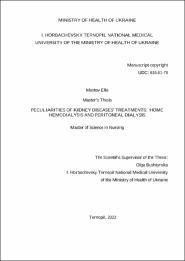Показати скорочений опис матеріалу
PECULIARITIES OF KIDNEY DISEASES' TREATMENTS: HOME HEMODIALYSIS AND PERITONEAL DIALYSIS
| dc.contributor.author | Mastov, Ella | |
| dc.date.accessioned | 2022-09-02T12:03:55Z | |
| dc.date.available | 2022-09-02T12:03:55Z | |
| dc.date.issued | 2022 | |
| dc.identifier.citation | Mastov, E. (2022) PECULIARITIES OF KIDNEY DISEASES' TREATMENTS: HOME HEMODIALYSIS AND PERITONEAL DIALYSIS. I. HORBACHEVSKY TERNOPIL NATIONAL MEDICAL UNIVERSITY OF THE MINISTRY OF HEALTH OF UKRAINE, Ternopil. 57 р. | uk |
| dc.identifier.uri | https://repository.tdmu.edu.ua//handle/123456789/17531 | |
| dc.description.abstract | The kidneys play an exceptional role in maintaining the normal functioning of the body. The main function of the kidneys is excretory. They remove by-products, excess water, salts, harmful substances, and some drugs from the body. The kidneys maintain the osmotic pressure of internal environment in the body at a relatively constant level. Along with other mechanisms, the kidneys ensure the constant nature of blood pH . They also perform a secretory function and take an active part in maintaining a constant internal environment in the body. Two methods of dialysis therapy are used in renal failure: hemodialysis and peritoneal dialysis. Their use is dictated by expediency, the available options and any standing medical tradition. The choice of the dialysis method is often a difficult dilemma for both the doctor and the patient. Both methods have a number of advantages and disadvantages, however, regarding the former, peritoneal dialysis still leads. Due to the great importance of the kidneys for the body, the nurses should have a good knowledge of the main symptoms of kidney disease, to conduct nursing process in diseases of the kidneys, to be able to provide pre-medical aid in emergencies (including those in a setting of hemodialysis and peritoneal dialysis), to prepare the patient for laboratory and imaging tests, and to perform monitoring and routine patient care. The main aim of the study: to investigate the specific aspects of diagnosis and treatment of kidney disease, to explore the options for improving organization and increasing the quality of healthcare team’s work with nephrological patients and compare complication rates in patients who have had peritoneal dialysis and hemodialysis. This study has explored the specific aspects and principles guiding the work in Nephrology, the main reasons why patients are admitted to the hospital Nephrology department, the specific aspects and principles of care in patients with chronic kidney disease, their positive effects and potential complications; this research work has determined the specific aspects of nursing process when working with patients in a nephrological hospital unit and in the home; the authors have studied the specific aspects of peritoneal dialysis and hemodialysis, the principles guiding the selection of a dialysis method, indications and potential complications; the authors have conducted an analysis and comparison of the number of complications when conducting peritoneal dialysis and hemodialysis in patients with chronic kidney disease | uk |
| dc.language.iso | en | uk |
| dc.publisher | Ternopil | uk |
| dc.subject | KIDNEY | uk |
| dc.subject | KIDNEY DISEASES' TREATMENTS | uk |
| dc.subject | HOME HEMODIALYSIS | uk |
| dc.subject | PERITONEAL DIALYSIS | uk |
| dc.subject | chronic kidney disease | uk |
| dc.title | PECULIARITIES OF KIDNEY DISEASES' TREATMENTS: HOME HEMODIALYSIS AND PERITONEAL DIALYSIS | uk |
| dc.title.alternative | Master's Thesis | uk |
| dc.type | Thesis | uk |

